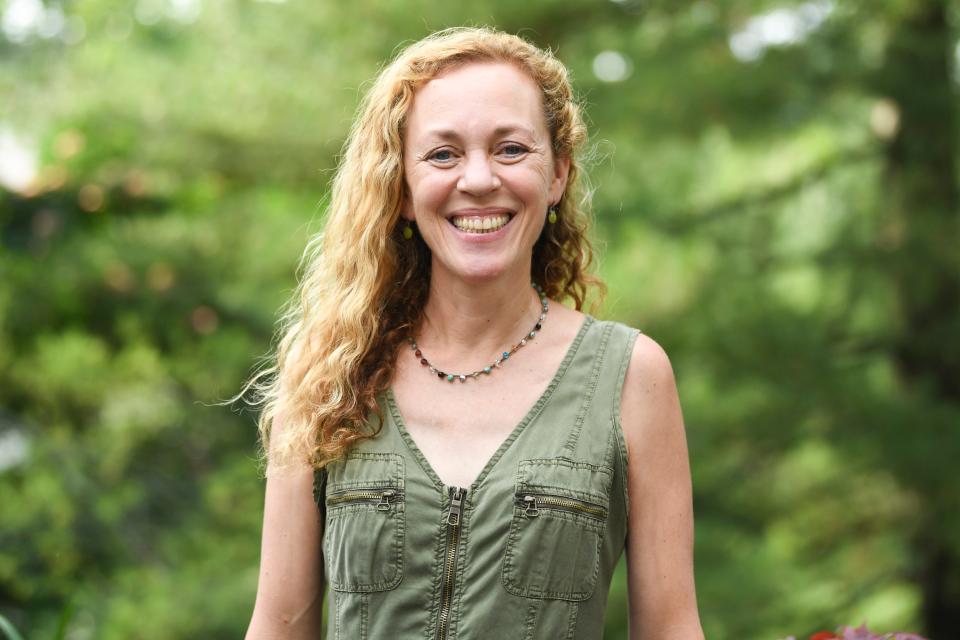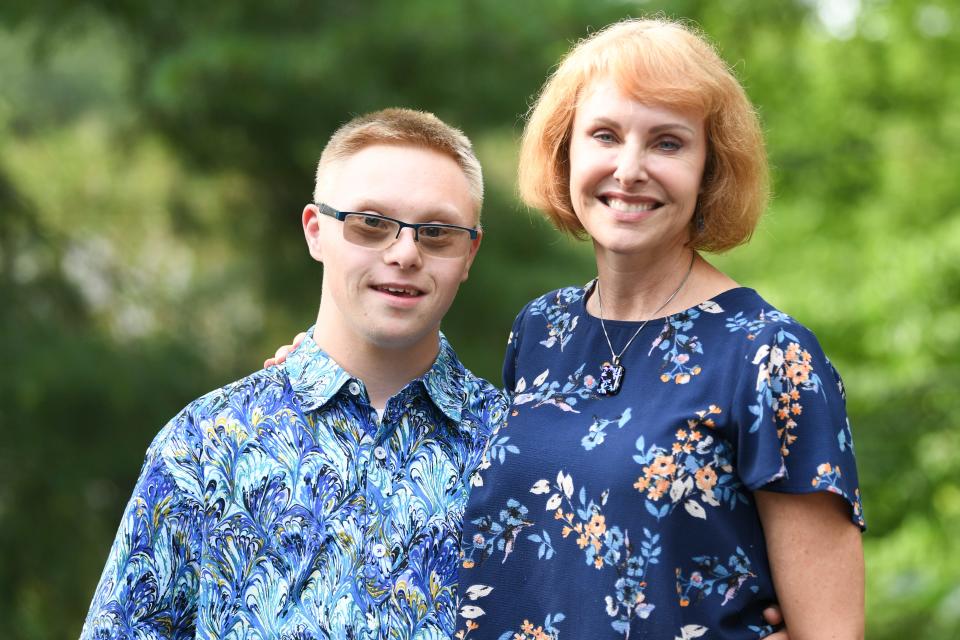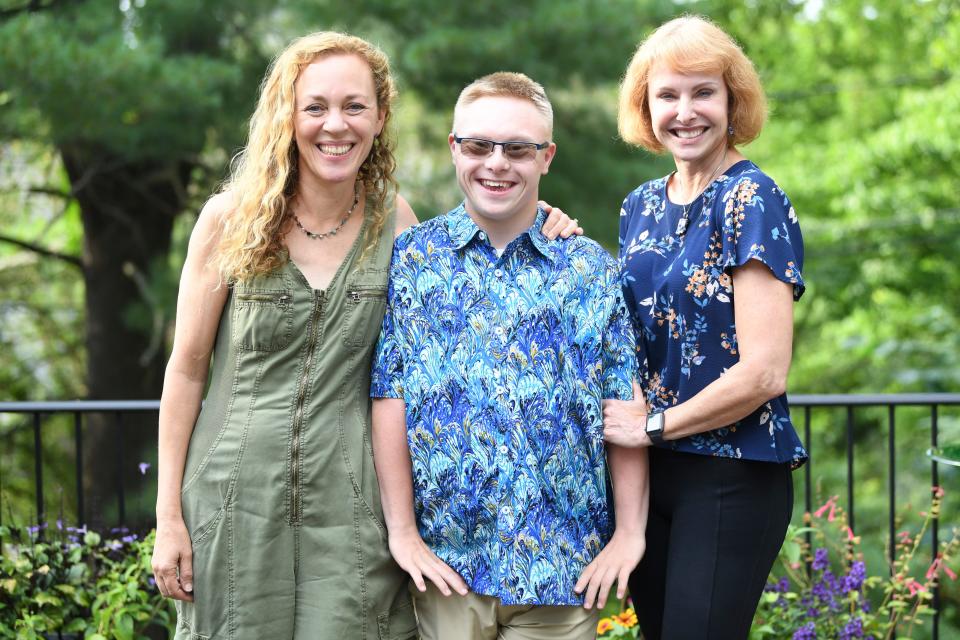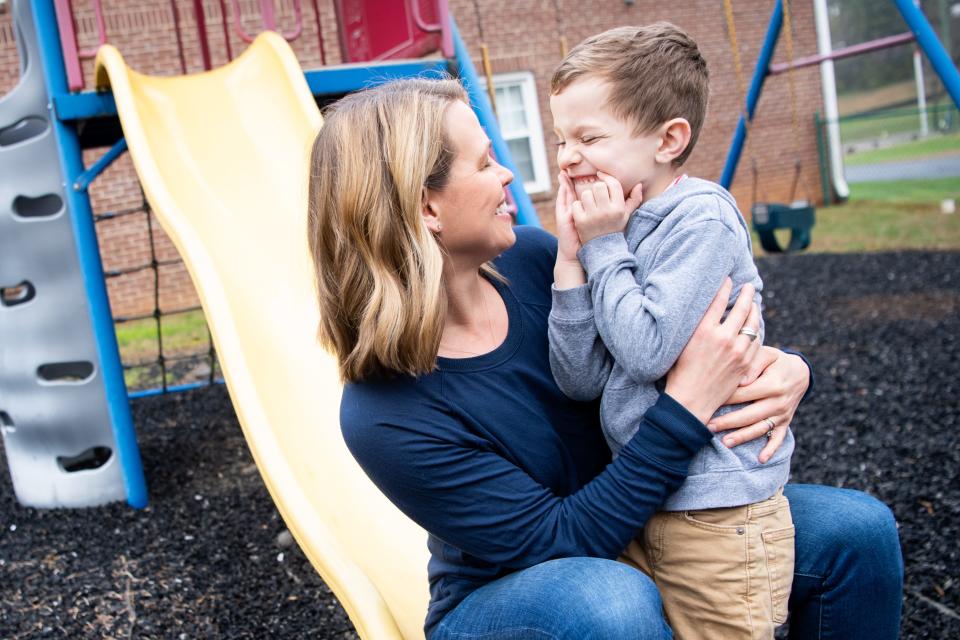Their decades of fighting for special education led to this moment at Knox County Schools
Kim Kredich has been to more school board meetings than she can remember.
For more than a decade, her advocacy has focused on the struggles of special-needs students in Knox County Schools.
Earlier this summer, Superintendent Jon Rysewyk announced a task force to make recommendations to the school board and administrators on how to better serve some of the district’s most-challenged students.
The task force will make its recommendations at 5 p.m. Aug. 7 at 500 W. Summit Hill Drive.
For Rysewyk, the task force is aligned with his priorities for the district, which he announced when he started on the job in June 2022.
"I think everything evolves over time," Rysewyk said. "Especially in the last year, we've had a continuous improvement mindset.
"We're all asking, how do we get better?" he said. "... How do we better serve our students?"
In Kredich's view, putting a serious focus on improving special education took years of litigation, advocacy, lobbying the school board and writing emails. She went as far as paying for the elected board to watch a movie on inclusion best practices.

Kredich’s fight is all about creating an inclusive learning environment for her autistic son and the 9,000 other district students in a special education program.
What does data say about inclusion in Knox County Schools?
Data backs up what Kredich has said all along: Knox County Schools fails at hitting a state standard for incorporating special-needs students into mainstream classrooms.
For at least the past three years, the district has not met the state's target for putting as many students as possible in the least restrictive environment. It measures how many students in special education have access to a regular classroom for 80% or more of their learning day.
In the 2021-2022 school year, the latest available data, nearly 69% of district's students with disabilities spent at least 80% of their time in general education classrooms. The state's target was about 73.7%.
The year prior, the number was 68% against the state's target that year of 72.6%.
Among neighboring counties, Knox County and Blount County are the only ones that have consistently missed the target in the last three years. Jefferson and Sevier missed it last year, too.
How did we get here?
Answering how the district got here isn't simple and it depends on who you ask. For some parents, the district has had a cultural problem with accepting students with special needs ‒ a claim district leaders disagree with.
"There hasn’t been an issue culturally accepting students," Rysewyk said.
Federal law guarantees a “free and appropriate education” to all children. The Individuals with Disabilities Education Act, adopted in 1975, requires public and private schools to make efforts to include children with disabilities in general classes in their zoned schools, not special institutions.
What support services are to be provided to a student are determined in their individualized education plan, which assesses a student's needs and creates a educational roadmap.
Over the years, Kredich has helped other families advocate for their children’s rights, especially in navigating the complex planning meetings for their kid's education. Along the way, she kept learning more about the law herself, she said.

Deborah Hyde grew up in Knoxville, graduating from Bearden High School, and didn’t think to leave Knoxville until in 2009 when her husband and she had to make a difficult decision for their son’s future.
"We had every intention of spending the rest of our lives here," Deborah said.
Luka Hyde, who was 6 at the time, has Down syndrome, a genetic disorder that causes mental and physical delays.
The Hyde family advocated for months and finally got the services they wanted for their son, but ultimately decided to move to Chattanooga. In the process, Deborah Hyde and Kredich became close friends.
"We got what we asked for but I realized they're setting him (Luka) up for failure because it's not it's not going to be easy. ... And I realized we've got 14 more years of this and I don't want to fight for 14 more years," Deborah said. “I said to Kim, 'I don’t want your life.'"
Little did they know the move from one public school district to another wouldn’t make the fight much easier and would tie them up in litigation for years. The public school system in Chattanooga didn't meet Luka’s needs, either — the most basic being for him to be included in regular classrooms.
More: Parents of some special education students say Knox school system not inclusive enough
While the Hydes enrolled Luka in private school, they sued Hamilton County, saying the district was violating his rights guaranteed under the Individuals with Disability in Education Act by trying to remove him from his zoned school to a segregated one for disabled students.
"It's very disappointing to me that Luka wasn't able to attend public school throughout his whole career," Deborah Hyde said.
Luka’s fight for inclusion reached the U.S. Sixth Circuit Court of Appeals in Cincinnati and in 2018 the court ruled in his favor, directing the district to reimburse the family for their legal expenses and for Luka’s private education.
Several Knox County students and their families in similar situations have sued the district over the years, saying administrators violated their students' rights.
In March, the Sixth Circuit court once again got involved in a fight for inclusion. In the case of a public school student diagnosed with autism identified by his initials as M.Q., the court ruled in favor of M.Q.
M.Q. enrolled in KCS's preschool program from 2016 to 2019, according to court documents, and he showed progress toward his goals. The district, however, proposed to place him in a separate setting, called comprehensive development classrooms, the following year.
M.Q.'s mother pointed out that he made great progress and vouched for him to continue in a regular kindergarten classroom. The district disagreed and the family sued.

Opinion: Knox County keeps losing your tax dollars in fight against special-needs children | Ashe
Chattanooga-based attorney Justin Gilbert, who worked with M.Q., has litigated several special education cases over the years, many of which have been on behalf of Knox County students.
How much taxpayers pay to defend the school district in a lawsuit depends on a lot of factors, Gilbert said, including if cases are settled and at what stage.
"One thing I always encourage school districts and school lawyers to do is to determine whether what is being asked of by the parent could be provided at minimal to no cost," he said.
Some cases cost several hundred thousand dollars.
“I get probably about 25 requests for representation every week, at a minimum,” Gilbert said. The cases come from all over the state. A significant number are from Knoxville, he said.
“Inclusion is a multifaceted concept,” Gilbert said. “It is more than just about putting the child in the right classroom. It can be as broad as school access. It can be as narrow as having modifications available for children so that they can more easily participate with nondisabled peers.”
"If educators viewed inclusion more through the lens of less separateness ... and how special education involves tools to include children in regular education, there might be fewer legal challenges," Gilbert said.
How the fight began for Kredich
The Kredich family’s fight began shortly after they moved to Knoxville in 2005 when Kim’s husband began coaching the Lady Vols swim team.
The family moved to Knoxville from Richmond, Virginia, where their son Benjamin already had an individualized education plan and was given appropriate support services. In Knoxville, Ben was zoned for Sequoyah Elementary School and just weeks after he joined, the district told the family he’d be better served in a separate school for autistic students, Kredich said.
Every year from then on at meetings to set her son's individualized education plan, one after the other, the Krediches had to request for resources for their son.
“We had a tough, tough time with Knox County Schools from the beginning,” Kredich said. Her advocacy took over her personal life — she quit work and let her passion for music take a backseat, too.
“IDEA has three purposes,” Kim said. “Future employment, further education and independent living.”
For Ben, Kim’s fight has paid off in achieving just those goals. He graduated high school in 2017, and now lives independently and plays piano at assisted living centers.
For Kredich, her focus is now on supporting Ben as he navigates adult life.
“I just have to finish this era in my life,” Kredich said. “Now that I have a young adult with a disability who is now employed, I look around and wonder how in the world are other kids going to get that same experience without a crazy mom like me? We've got to get this right and we’ve got to lay the groundwork within the public school system.”
'Confusing and conflicting information'
Earlier this year when a group of parents began showing up at school board meetings, they voiced their frustrations over the lack of clear answers from the district as they navigated special education.
More: Parents push for autism therapy after 'exhausting' fight with Knox County Schools

“For months, we were getting confusing and conflicting information,” Cortney Piper, one of the concerned parents who spoke to the board, told Knox News earlier this year. “We didn’t have the information we needed. ... I was exhausted navigating the process.”
Piper’s fight paid off and the board unanimously voted on a policy in June that gave students access to the kind of therapy she was fighting for.
Piper is also serving on the superintendent’s new special education task force.
Never stopped believing in the public school system
Despite the differences and the struggle, Kredich never thought to pull her son out of public schools.
“We believe fully in public school and never ever considered putting any of our children in private school,” she said. “My husband and I were both raised in the system and the more we learned about the protections offered under IDEA, the more we believed in the strength of the public school system.”
Despite the many cases he has fought, Gilbert too still believes in the overall success of public education.
"Public school is the best place for children to learn inclusion and empathy and to learn about differences and the values of inclusion," he said.
Areena Arora, data and investigative reporter for Knox News, can be reached by email at areena.arora@knoxnews.com. Follow her on Twitter @AreenaArora.
Support our newsroom's exclusive, in-depth local coverage by subscribing at knoxnews.com/subscribe.
This article originally appeared on Knoxville News Sentinel: Parents fight for special education rights at Knox County Schools

